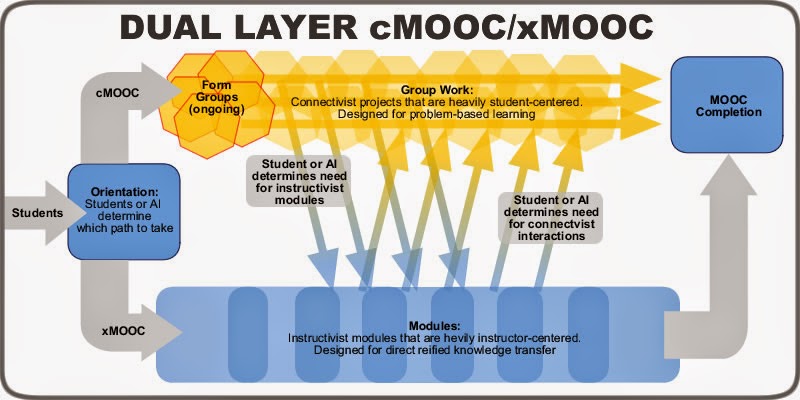Can students opt out if you teach in Open Learning?
 |
| Siemens, 2014 |
Anyway, Discussion forums have been added to Connected Courses, and a discussion cropped up on whether students can opt out of the open course if you are teaching in an open environment. If they are not comfortable with open, is there an option for them to participate in a closed version, which I guess is similar to an a traditional online course through an LMS. I am not sure how much I will participate in the forum, so I thought it would be an interesting though exercise to post some initial thoughts on here and have a discussion about the topic on here (or via a network of blog posts) since it connects with what I might be doing as an experiment for my dissertation.
So, really quickly: my idea revolves around "converting" a traditional online course to an open online course. Now whether it reaches Massive dimensions, that's another question. Then teach, collect data, and see where that goes. This is my 30,000ft view, details still hazy (I have 2 years to come up with a more concrete proposal).
So, the initial sketches and ideas that are going into my ideas-notebook have to do with George Siemens has a dual-layer MOOC proposal. I have a sneaking suspicion that most MEd level students will not be comfortable being thrown off the deep end of a cMOOC. Some might do fine, especially if they are interacting with people like the #ccourses crowd, but some might require some scaffolding and building up of their network literacies, thus they might need something a little more familiar. The xMOOC format, at least what one sees in coursera, edx, udacity, novoed, and so on, would be of use to them. As the learners progress through the MOOC they can switch tracks - cMOOC to xMOOC and vice versa - as they feel that it is fit for them. However, in conceiving of the xMOOC track I don't foresee a sign-in wall like most xMOOCs, so the question in the forum gave me pause to think. What if some students don't like the idea that others, who are not signed up and paying for credit, in the course are logged in and are reading their forum posts and blog posts? Should they have a private little area that acts more like a traditional course?
My initial inclination is this: no. The course is offered in the format that it is offer (an open format) and since the course is an elective, the learners don't need that sort of an accommodation (an accommodation to use only a closed course). I do realize that this sounds inflexible on my part, and that I might be throwing some learners into the deep end of Open Learning. It's also not really andragogical in that I am not coming to an understanding and negotiating the course structure with them a bit. On the other hand, it really makes me think about what learners are really paying for when they are paying for a credit-bearing class. Are they paying for an evaluation of their capabilities? for mentoring? for instruction? for all of the above? The idea behind my experiment is that the Open Course could run in defined semesters for people who want to take it for credit through their institution (mine would be an example since I teach this course), and it would be open for anyone to take at any time, or in concert with cohorts taking it for credit. Thus, at any give time you have learners who are both taking the course for credit and those who are doing it for free because they are curious about the content.
If instruction and content are given away for free (in a MOOC anyway), then what's left? In a free open course one may say that the course was developed to be open to begin, so closed is not an option. Unless, of course, the learners fork to MOOC and go off to play in their own private sandbox - which is perfectly fine with me. However, once you start mixing credit-bearing aspects of a course and MOOCs, things get a little more murky. What are the expectations of the learners? What are the expectations of the institution? Is everyone on the same page as to what each person's role is in the course? I don't have a clear-cut answer at the moment, but my initial gut feeling is to go with Open, unless people want to fork the MOOC.
What are your thoughts? What DO learners pay for when they attend a for-credit course? What if you made that course free, why would they pay for it if it's a free OOC?


Comments